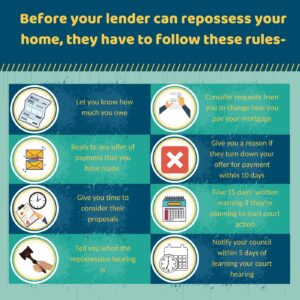How long does a house repossession take?
How long does a house repossession take? Your lender will have to follow several steps to apply for a repossession order, which can take up to nine months if the order is successful. You are able to speak to your lender throughout this process to drop the repossession order if you’re able to make your

How long does a house repossession take?
Your lender will have to follow several steps to apply for a repossession order, which can take up to nine months if the order is successful. You are able to speak to your lender throughout this process to drop the repossession order if you’re able to make your payments, so communicate with them as much as possible to avoid your house being repossessed.
If you’ve been struggling with the threat of repossession, you should know each step and the time frames, so you know what you’re up against. A repossession can be reversed, so knowing where you are in the process gives you more chance of resolving and keeping your house. We Buy Any House have outlined the repossession process to provide you with all the information you need.
“I need to sell my house fast!” – Get a cash offer for your house today!
How do I become at risk of a repossession?
If for whatever reason you miss a payment on your mortgage you’ll be in arrears. While mortgage lenders aren’t going to immediately apply for a repossession order, there are steps that they need to take. They will write to you and alert you that you’re in arrears, requesting you to get up to date with your payments. If you’re able to do so, you should pay these payments straight away. If you’re not able to make your payments, you should contact your lender and make them aware of the issues you’re having. You should be able to develop a plan with your lender and work out a way for you to be able to manage your payments until you’re in a stronger position to pay them in full again.
What happens if I don’t tell my lender I’m having financial issues?
If you don’t take control of your arrears, or you aren’t able to come to an agreement with your lender in your current situation, your lender can apply for a repossession order in court. They are unable to repossess your house without this order. When applying, they will present to a judge the reasons they want to repossess your house.
What are the next steps?
Once your lender has applied for a court order, the courts will set a date for a court hearing. At this hearing, you will have the chance to explain your circumstances and the judge will make a decision as to whether your lender will get possession of your house. At this point, you still have the opportunity to speak to your mortgage lender and arrange a plan to pay back your arrears. You should get legal advice if you’re able to, to make sure you present the best case you can in court.
What can the courts decide?
There are a few different decisions that a judge can make after your court case. They may declare –
- That your house will be repossessed by your lender. If this is the outcome, your lender will evict you from the house and sell it to repay your arrears.
- A suspended possession order. This will allow you a second chance to get your mortgage payments under control. There will be strict conditions that you’ll need to adhere to, and if you don’t, your lender will be able to obtain a repossession order.
- That your case should be adjourned. This will usually mean a delay in the case, but that you will need to return for the rest of the case after an agreed amount of time.
- That the case should be dismissed. While this is a rare outcome, if your lender doesn’t follow the correct procedure for a repossession order, a judge may dismiss the case allowing you to keep the house.
A judge approved the repossession order, what happens next?
The judge will decide a date that you’ve got to leave the house for your lender to repossess it. Usually, you’ll be given 28 days to find somewhere else to move, but this is subject to change depending on your situation and the judge’s final decision.
I don’t want to leave the house – can they force me?
If you refuse to leave the premises, your lender can instruct bailiffs to remove you from the house. While bailiffs do have to follow the law, they are allowed to use a certain amount of force to get you out of the house and can come at any point to remove you. If you’re not in when the bailiffs arrive, they can break into the house, remove your personal possessions, and change the locks. Refusing to leave the property will cause you even more trouble down the line, so it’s recommended that you find somewhere else to live in the timeframe the judge has given you.
‘Can We Buy Any House help me sell my house?’ – Learn how we can help you today!
How long does the repossession process take?
With the various steps that lenders need to follow to apply for a repossession order, the whole process can take up to 9 months. This can differ case to case, but in general, it’s quite a slow process. There are several chances throughout the process that you can resolve the arrears, and you should take every step you can to talk to your lender and find a way to get back on track. Your lender will be able to suggest several different ways to manage your arrears and will want to work with you to find a resolution rather than repossessing. Repossessing a house is a lot of work for your lender, and they would much prefer to give you some leeway for a few months than deal with the repossession process.
What happens if my house is repossessed?
If you’re being threatened with a repossession order and you know that you’re not going to be able to make your payments in the future, you might want to consider selling your house before the repossession order is granted. When your lender sells your house on after a repossession, they’ll likely sell it at an auction, which will usually result in a lower sale price. After a sale, the lender will take what you owe from the proceeds, and then whatever is left is yours. If you sell your house yourself, you’ll likely achieve a higher price giving yourself more to work with and fund your future living arrangements. Another reason that selling your house to avoid repossession can benefit you is for your credit score. A repossession will do a considerable amount of damage to your credit file and will linger on there for years. This will make it very hard for you to be approved for another mortgage in the future and will cause problems for any type of lending that you may want to do.
Selling your house to avoid repossession is a good solution to your problems, and can be done quickly and easily. We Buy Any House are here to buy your house in as little as 7 days, allowing you to pay back your arrears and move forward. Get in contact with us today for your free cash offer.
We buy any home in as little as 7 days, or timescales to suit you. Head to the We Buy Any House website for more information.


